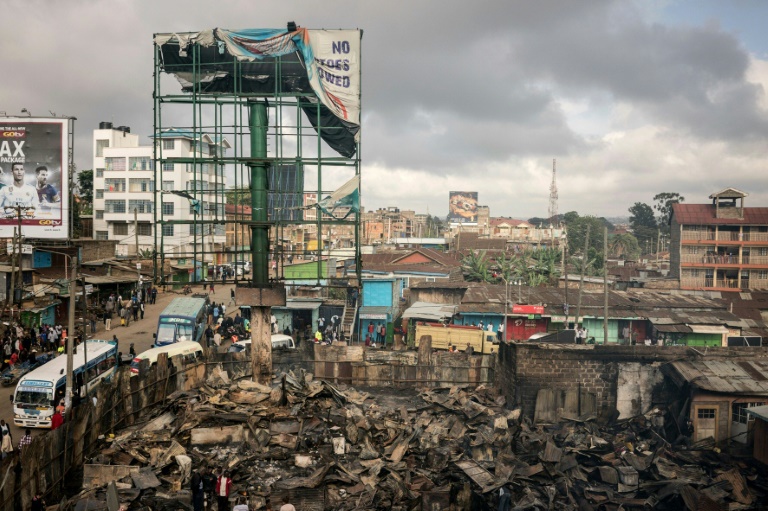WATCH: Ugly scenes erupt in Orlando after Pirates v Alger game
"That was the bedroom," said Steven Chege pointing to a tangle of charred wire, blackened metal sheets and burned wood. "And that was the first room," the 32-year-old said, gesturing at a melted stereo and a shattered television among the smouldering ashes.
“The intention was to burn us alive in our houses.”
Chege’s ruined house, beneath the skeleton of an advertising hoarding at Congo Junction in Nairobi’s poor Kawangware suburb, was one of dozens of shops and homes burned when political protests took a dangerous turn on Friday with rival neighbouring communities fighting in the usually crowded streets.
The incidents of violence that have scarred this Kenyan election period have almost all featured stone-throwing opposition protesters against police using tear gas, water cannons and, sometimes, bullets.
Nearly all of the 49 people killed since the initial August 8 poll were shot dead by police, and almost all of them were supporters of the opposition National Super Alliance (NASA) coalition, living in the Nairobi slums of Kawangware, Kibera and Mathare, or in the western city of Kisumu and its surrounding area.
All are strongholds of the opposition leader Raila Odinga.

Dozens of shops and houses were burned to the ground when political protests took a dangerous turn in the Nairobi slum of Kawangware
But in Kawangware on Friday afternoon, the day after the opposition boycotted a re-run presidential vote, the routine battles between police and protesters became something different as dozens of men, believed to be members of President Uhuru Kenyatta’s Kikuyu tribe, fought against NASA-supporting Luos, Luhyas and Kisiis.
Both sides were armed with machetes, knives, clubs and rocks. Police said officers shot one man dead but residents claim others also died or were maimed in the clashes.
– Ethnic bent –
What started the violence is disputed, with each side blaming the other, but all acknowledge the ethnic logic of what followed.
“We were targeted because this is a Kikuyu place,” said Geoffrey Mbithi, a 42-year-old hotelier whose three-room guesthouse is now a pile of bent and blackened corrugated tin sheets.
“This is about tribalism.”
The blaze ripped through shops, stalls and houses in Nairobi’s Kawangware slum
The unrest, though isolated and lasting only hours, was reminiscent of the widespread politically-motivated tribal violence that followed a disputed election a decade ago in which more than 1,100 people died during two months of upheaval.
“I was inside the house when I heard people saying, ‘Fire! Fire! Fire!’,” said Rose Kiema, a 50-year-old seamstress who has lived and worked at Congo Junction since the 1980s.
She ran away, only returning on Saturday morning to find the still-smoking wreckage of her mangled sewing machines. Nearby, lay three chickens and a tethered goat that had burned alive in the inferno, a charred cabbage and singed shoes from the cobbler’s shop.
Kiema and others blamed NASA-supporting youth for the arson, and a local politician for inciting the attack.
– ‘Because we voted’ –
“We were targeted because we do not support NASA,” said Josphat Gatimu, a 62-year-old with a small dishwashing and laundry service, both his machines burned beyond salvage. “We voted, that is the only reason we are getting this.”
A mile down the road, groups of mostly young men stood around chatting. There was no sympathy here for the shopkeepers of Congo Junction, nor denials of involvement in the arson which they said was justified retaliation.
“This place, it is a NASA stronghold,” said one man in his 20s who did not want to be named.
Groups of young men carrying machetes and knives could be seen stalking through the streets of the Kawangware slum in Nairobi
“What is going on here is the government is trying to force some bad groups from another community… to come and intimidate us,” he said, referring to the ‘Mungiki’, a feared Kikuyu gang known for running protection rackets and violently defending tribal business interests.
During the election violence of 2007-8, Kenyatta was accused by the International Criminal Court of ordering their deployment, but he always denied it. The term is now widely applied to groups of armed Kikuyu men, like the ones who showed up in Kawangware on Friday.
“If Mungiki come, even if it is thousands and thousands, we will defend ourselves, we will fight them,” said the man, a member of the Luhya tribe.
“If they don’t send police and Mungiki in this stronghold, then we are at peace, as you see,” he said standing at a crossroads marked by another burned property which was also, they said, owned by a Kikuyu.
Download our app